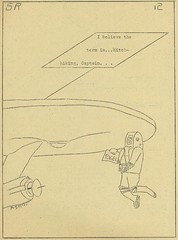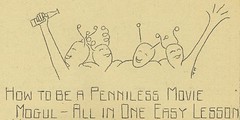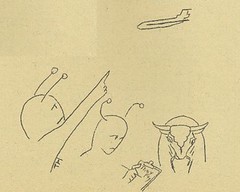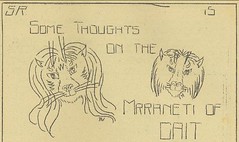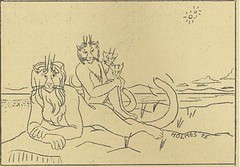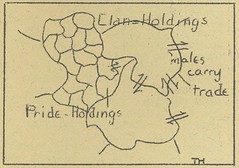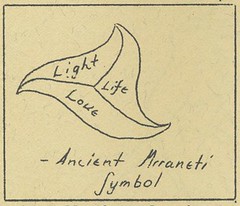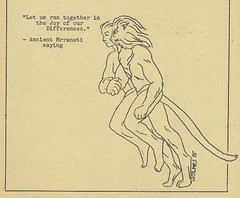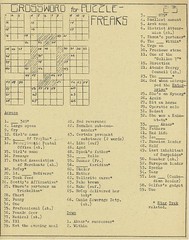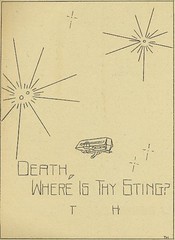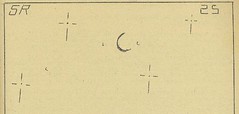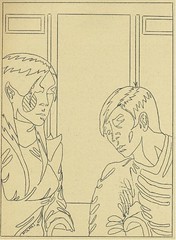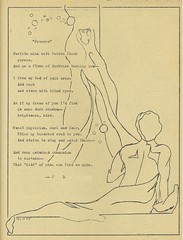Tuesday, July 11, 2006
How to be a Penniless Movie Mogul -- All in One Easy Lesson
I never remember getting drink with my friends, but this article would seem to suggest otherwise~!
* * * * * * * * * * *
10/3/75
Four drunk aliens walking down the side of a super highway, thinking Earth people are cows! Can you imagine that? Well, if you can, you need help because you’re on the same wavelength as the people at EDWIN CONNELL Productions.
H----- H-----, T------ H-----, R---- A--, and J--- B--------, all of whom are charter members of ECP and make up the Board of Directors, are busily at work trying to make the above statement become a reality. . . At least. . . they were. The movie in which they were to accomplish this was originally scheduled to go into production on July 23, 1975. But here it is October 3rd and they still don’t have anything final to put on film.
What it really boils down to is a lack of money. As of this date, the movie fund has all of 25 cents. Lots of capital, huh. They can’t afford the film! Or the camera for that matter. Because of the nature of the movie, it may be necessary to film on location somewhere in northern Michigan. They can’t afford the gas to get there. The only thing they have enough for is a pencil! And that’s scraping the bottom of the barrel. . . Ah, correction. They can’t afford a barrel!
“Money can wait,” they said. “All we want to do now is talk.” And talk they did, for 2 ½ months.
Actually, it wasn’t until September 14, 1975 that the movie idea really took shape. It was decided during a meeting of the Board of Directors that the movie would be a SF short. It was also decided that it would be called “Space 1998: A Visit to a Strange Planet.”
Although originally it was meant to be a serious movie, so far the format consists of a series of comical misadventures. It takes place in the year 1976, which, at the time of this writing is next year. A group of alien astronauts assigned to study the civilizations of the planet Earth discovers a malfunction in one of their main engines. After deciding that they can’t make it to their home planet because of the damaged unit, they land on Earth. After that point the story becomes a collection of zany incidents centered around the aliens and their search for some way to repair their ship.
Penniless Moguls, continued
For instance, after they leave the ship, the first life-form they meet is a cow. They take it as an example of the prime native inhabitants! Then a jumbo jet flies over them. They look from cow to the jet and back again, then write in their little notebooks, “They fly.”
Later, they emerge from the woods in which they have landed and come to a highway. Here they meet a wino swigging from a bottle. He looks at them, then at the bottle, then at them again, drops the bottle and runs away. Curious, the aliens pick up the bottle and drink it down, with the usual results.
Crazy? Yes, but you were warned. After all, as one of our bright and shiny directors has said, “Living is doing all of those crazy things you always wanted to do, but never quite dared.”
I guess the people at EDWIN CONNELL Productions are just living.
Mr. JB
Mrraneti of Cait, part 1
Rereading this one, I am clearly reminded that I was a sophomore in HIGH SCHOOL when I deigned to undertake this project with my friends. Ms. TH, who has authored (and illustrated) much in this first issue was both generous with her submissions and her technical understanding of how mimeographs worked, for example. Note that all of the images in this issue were hand drawn onto the wax coated film of the mimeograph templates -- and now with computers! Oh my!!!
* * * * * * * * * * * * * * * * * * *
(Note: This is the first in a series of studies of various races of the Federation, presented as a service to serious ST writers who would like to know more about such peoples as the Mrraneti, Tellarites, Andorians, Orions, Rigellians, and the like. We would appreciate feedback – not to mention other studies. TH)
INTRODUCTION
I’ve chosen the Mrraneti to begin the series primarily because I’m partial to the cat family, but also because I find Lt. Mrress (animated version) intriguing, and because the Mrraneti play an important part in “The ‘Les Mesdemoiselles Federation’ Affair.” Which you will read later.
No proper study of an alien race would be complete without a description of its physical attributes, the nature of its basic social unit, and the multidimensional overview of its general cultural pattern, all necessarily brief and generalized.
PHYSICAL APPEARANCE
If one were to characterize the Mrraneti through comparison with Terran life forms, one would be forced to classify them with the feline group. They have the same blunt face, large wide-set eyes, upstanding ears, flexible tail, and retractable claws common to all the cats. Furthermore, their juveniles are spotted, and all retain markings typical of the group.
There is, among the Mrraneti a marked sex difference. The males are both taller and heavier, weighing in between 80 and 95 kg. (176 and 209 lbs.) on the average. Their most striking attribute is a long, heavy mane. The females, weighing in between 50 and 65 kg. (110 and 143 lbs.), have shorter finer manes, little more than cheek tufts in some classes.
Fur coloration is generally beige to russet overall, shading to buff along the ventral surfaces and to the dorsal ridge of sable or black, with other markings, generally clan-specific. These include the presence or lack of brow marks, cheek stripes, tail rings or tip and light and dark extremities. The manes are usually darker in both sexes, tan shading to black.
The Mrraneti skeletal articulation is decidedly feline, particularly in that they walk on their toes, each foot having four. They are, however, completely adapted for bipedal movement, although their center of gravity is better suited for the fast sprint or trot than for the walk. Though they have only eight toes, they have ten fingers, each equipped with a fully retractable claw. As their fingers are blunter than those of humans, most fine manipulation is performed with the aid of the claws. This extends the Mrraneti manual dexterity slightly beyond that of humans, since claw-tips can get into places that fingertips can’t.
Physically speaking, then, the Mrraneti most resemble the Terran lion, although the resemblance isn’t complete.
Mrraneti of Cait, part 2
THE PRIDE: BASIC SOCIAL UNIT
The similarity between the Mrraneti and the lion of Terra extends beyond appearance into their very way of life. Among this species, the basic social unit is the pride, rather than the family, as among humans. Out of this unit arises the whole of their complex societal structure.
A typical pride consists generally of a group of related females, either sisters or cousins, or both. This core, numbering anywhere from three to seven, is responsible for selecting its pride-masters from either the bachelor groups, or through trades (often very complex) with other prides, and for raising the resultant off-spring with them. There are seldom more than three pride-masters in the pride at any given time, and their tenure of residence is usually seven to ten years. During this time, they copulate freely with all the females when the latter come into estrus, normally in the spring. This and the changing of pride-masters tend to allow for the greatest genetic spread of traits, thereby preventing inbreeding. At the same time, the relatively low fertility rate among the females acts as a brake on the population growth curve.
An interesting sidelight of this kind of interrelationship is that the Mrraneti have no equivalent for what humans call romantic love. Six is a very enjoyable pastime during its season, but for the rest of the year it doesn’t enter into the relationship at all. The Mrraneti know affection, loyalty and companionship, but not the specificity of the human pair bond, and certainly not the neurotic addiction that so often passes for love among humans. Each individual finds a wide and varied constellation of relationships open to him, so loneliness is virtually a word without meaning.
As an intelligent, self-aware species, the Mrraneti are relatively young, on the order of six to ten thousand years of recorded tradition. Yet during this time, they have evolved an extremely complex social system based on the pride, which governs their every action. It is complex, yet flexible enough to handle almost anything. To the outworlder, it seems even more complex than that of the Vulcans, yet somehow, it seems to work for them.
The Mrraneti are polite and formal almost to a fault, or so it often seems to the outsider. There is a very good reason for this. It is an outgrowth of their carnivorous nature and territorial background, and serves to channel aggression firmly in the proper directions and maintain interpersonal harmony. The fact that other peoples don’t recognize the need or reason for this apparently excessive formality is placing a serious strain on the Mrraneti exposed to the outworlders. Sooner or later, one of them may be provoked into a regrettable action.
Mrraneti of Cait, part 3
THE SOCIAL STRUCTURE
Based on the pride, which is essentially a group of related females selecting mates from a large pool of possibilities, the Mrraneti social structure is best described as a matrilineal patriarchy. This is, lineage is counted through the mother, while authority is held by the father. Outworlders tend to find very confusing the idea that authority should reside in the males, who can be removed at anytime by the females. Even more confusing is the ingrained deference of the pride-masters toward all females, particularly the pride matriarch, the oldest female in the group. They respect her desires although she submits to them.
Beyond the pride is the clan, which consists of all the females within the area of the clan holdings, usually several thousand square kilometers. All are related, and claim to be able to race their ancestry back to a single founder. There is some evidence that the Mrraneti may indeed be a colony of an earlier civilization – or, an even more intriguing possibility, they may actually be a carefully bred race of descendants of the Terran lion, an experiment by some past race like that which preserved cultures from Terra which might not otherwise have been viable.
Each clan is rigorously exogamous, exchanging males freely with neighboring clans. It is custom with the force of taboo that no male may copulate with any female of his birth clan, an injunction passed down through the tradition in tales of horrible calamities visited upon the erring ones.
Because the clan is the highest step on the organizational ladder of the evolving social structure, government is totally decentralized, resting essentially in clan, pride, and individual. The exo-sociologists on the early contact missions were completely baffled, unable to understand how the Mrraneti could have advanced so far in such a short time without a centralized government. The Mrraneti tried to explain that it was precisely because of that lack, but they were misunderstood. As a result, the Federation tried to impose upon them as a condition of membership a republican form of government, but Mrraneti just laughed and refused. It wasn’t until the Vulcans, stuck with their own unnecessary form of republican government explained to them that there were uses for the apparently useless, that they accepted. Their executive officer is called Master-of-Prides and serves primarily as a figure-head, there being no laws for him to execute. The legislative assembly consists of bachelor males who gather together during the mating season (when there’s precious little trading to be done because everyone else is totally occupied) and spend the time telling tall tales, which to no end shocks the human ambassador in residence, because he fails to realize that these males are in the process of editing the Tradition, a very important part of every Mrraneti’s life. As for the judiciary, it is called the Council of the Wise, and is the only body for which there is any purpose recognizable to humans. It consists of the oldest members of each clan, those who have lived beyond the breeding age. Each clan has its own council to setting internal disputes. For interclan difficulties, a very rare occurrence, the Councils get together for a very careful consideration of the Tradition and, after much deliberation, render a decision. Most of the occasional disputes are of a civil nature; crime is a rarity, and murder is looked upon with such horror as a denial of society that the murderer, if unrepentant, is perpetually banished. Murder is so rare that there have been no recorded cases in nearly a hundred standard years. However, increasing outside contamination may alter this.
Mrraneti of Cait, part 4
Economically, the Mrraneti rank with the Vulcans in the apparently phenomenal stability of their market system. To humans, used to industrialism, they seem rustic and primitive since most of the prides engage in farming. Farming you ask? But the Mrraneti are carnivorous. Wouldn’t they be a hunting culture? The answer is no. The hunter has no time to develop a civilization. The Mrraneti are farmers who grow feed for their livestock, which they kill and eat. It’s the same for us.
The Mrraneti have an enviably stable currency in their gold and gold-backed credit. A secondary medium of exchange is the males of the species, but they know better than to trade solely on such a chancy thing as genetics. Their general market seems picayune by comparison to the vast selection available to the rest of the Federation, but it is quite sufficient for the present needs of the Mrraneti, and quite flexible enough to be able to handle any future needs. They are presently exploring the broader market of the Federation to see where they may contribute most profitably. Some possibilities are wool and leather goods, ceramics, artworks, foodstuffs, refined metals, rare alloy, and the like.
Trade on Cait is carried on primarily by the adolescent and young adult males, to whom wandering is a way of life from the age of seven to that of about twenty or so, when they reach physical maturity and are tapped for mastership.
Besides goods, the trade caravans also carry the major burden of communication between prides and clans. Technological advances have as yet taken only a small bit of this burden, not surprising since the Mrraneti are extremely conservative and like to consider carefully the ramifications of any alteration before allowing it in. This may seem odd in such a highly advanced culture, but it is actually one of the prime factors in that advance.
The Mrraneti have been called lazy and indolent, even decadent, but some who have seen how much leisure time they have to spare from letting carefully tended machines perform the most time consuming of the chores. This is because they enjoy it to the hilt. They are excellent artisans and entertainers, rivaling the Vulcans in the richness of their artistic ability and tradition. All of their art is based on the vast oral (and oral means something quite different to the Mrraneti) Tradition, which is as old as they are.
Strictly speaking, the Mrraneti have no written literature. Their only written language is mathematical, used in engineering and related areas. Everything else is encompassed by the Tradition, which is so extensive only the Vulcans have any conception of what it’s like. It surrounds every Mrraneti from birth. IT consists of the pride’s traditions, the clan’s traditions, the lays of derring-do learned from fathers who once roamed far and wide. With such wide communication as it available to the individual, either directly or indirectly, he or she usually comes in contact with a considerable portion of the Tradition in the course of a ling lifetime. Of course, no one person could possibly know the entire Tradition, but because everyone learns as much as possible of it, and thereby contributes continuously, it is truly a living, growing part of each individual.
The communication of such a rich tradition calls for a language capable of communicating extremely subtle and fine nuances. Rather than the exceedingly complex, precise verbal language of the Vulcans, the Mrraneti have opted for body language, so that their every action is communication. This, although their verbal language consists of little more than sounding-sounding grunts, growls, and coughs, there total language is actually a very subtle, flexible instrument of expression, not at all artificial, but flowing and naturally graceful.
Although to the outsider, the Mrraneti may seem excessively formal, this formality in no way implies rigidity of response. Rather, it is symptomatic of respect for all others. The Mrraneti realizes the truth that formality based on respect is actually far more flexible than is familiarity based on disrespect. For them, all manners and customs are predicated on respect for the other person.
Out of this respect for self and other comes their philosophy and theology, neither considered a formal discipline. The first is generally a subject for idle speculation (assuming there is any time left over from the many other pursuits) and the other is considered a forgone conclusion. Obviously the universe is an ordered creation and equally obviously, the creative force is benevolent. For the Mrraneti as a whole, there has NEVER been any doubt on this point. At the same time, however, they have never shown any tendency to anthropomorphosize this creative force. Indeed, there is no explicit means of referring to it. Instead, it is implied by every thing they do. In other words, their theology is so totally practical as to have no room for speculation at all. As a result, human theology, with its confusion of concepts and emphases, is a complete mystery to them.
Mrraneti of Cait, part 5
PROBLEMS
One may properly chide me for making it sound as if the Mrraneti are perfect paragons of virtue. They aren’t, of course. They are often guilty of a kind of puzzled smugness that comes of comparing their society to that of, for example, humans. They have, in the past, been guilty of some horrible gaffes in their relations with other species, notably the Tellarites and the Andorians, this due to their chronic inability to understand that other races are NOT the same. Their stable society is under increasing outside pressure that could shatter it, if the danger is not recognized in time. Already there is an increase in the number of civil disputes requiring arbitration.
A society based on respect can be maintained only as long as that respect remains inviolate. The Mrraneti have taken mutual respect for granted since the beginning, and therefore have no defense against disrespect. Although they might be characterized as godly by Christians (and too good to be true by everyone else), they’ve not had the experience of fighting their way through the weeds to reach the sun, as humans and Vulcans have, thus they have little or no resistance as a species to the disease of pride and the desire for self-determination. For the Mrraneti, the danger is indeed grave, but one should be reminded that the greater the crisis, the greater the opportunity for growth.
CONCLUSION
In presenting these thoughts on the physical, social and cultural aspects of the Mrraneti of Cait, I hope I have succeeded in conveying some of the essence of this mysterious people. If I have, that is enough for me. TH
(And the image includes the following text and was originally placed at the end of the article)
"Let us run together in
the Joy of our
Differences."
~ Ancient Mrraneti saying
Monday, July 10, 2006
Death, Where Is Thy Sting?
This story was the creation of Ms. TH. It comes out of her feelings about the implied 'atheism' in Star Trek, and in particular one treatment of death in a story in our sister fanzine, INTERPHASE (see the author's notes). And as such was a welcome idea in the pantheon of SciFi spirituality. It doesn't necessarily reflect the opinions of myself or the other co-founder of this 'zine, but hey, it doesn't have to.
Death, Where Is Thy Sting?, part 1
The tiny shuttlecraft drifted now, its nose and undercarriage crumpled and dented, an infinitely small bit of jetsam in the immensity of velvety black space; a speck of dust on a jewel-encrusted curtain. It was only three days out from Starbase 10, but was now falling inexorably into a trajectory that would, if uninterrupted, bring it some years from now in the vicinity of the double component of the triple star system of which the starbase and its parent planet were a part. Bu that time, of course, its two occupants would be long dead, their forms inert and frozen in the vacuum of space.
Indeed, as they lay sprawled in the pilot’s and co-pilot’s chairs, one with his head hanging to one side, the other bent over her half of the control console, they seemed lifeless already in the gloom, relieved only by the starlight shining in through the three forward ports.
Then the woman who lay over the controls stirred, hardly more than a trembling of the finely shaped fingers of her gangling left hand. The tremor soon ceased, stilled into motionlessness. A moment later, with one smooth effort, she lifted her head from the console, brushed tumbled black hair from her bruised and cut face, tucked it nearly behind elegantly pointed ears. A single sweep of dart eyes under upswept brows told her the status of the tiny vessel. Efficiently she touched controls, but there was no response.
She turned then to the young man, who lay in ungainly confusion in his chair, head drooping over its back, his arms hanging. She touched his exposed neck to one side of his prominent Adam’s apple. His pulse was, for a human, rather weak and fast, and she showed no signs of imminent arousal. For the present, however, he was alive. How long he would remain alive was problematical.
As there was nothing she could do for him immediately, she returned her attention to the vessel, rising slowly from her chair, acutely aware of her own serious internal damage. If life was to continue for either of them, she must at least attempt to devise a means of signaling the starbase as to their whereabouts. Supporting herself with a hand on the back of the chairs, she made her slow way aft. There was some power still, for the gravitational field was being maintained at one-sixth it’s normal strength. Perhaps it would be possible. . . .
In the aft compartment, containing access to the life-support system and the engines, she examined the read-out panels, a blaze of glowing oranges and three lonely yellows. There were no cool, comforting greens. She flipped circuit breakers, cutting power to all systems save life-support and gravity to conserve the remaining battery reserves. No logic in feeding power to non-functional systems. The orange lights winked out, leaving only the yellows. Taking up the first-aid kit, the woman made her difficult way back to the dark control console, aware that once she sat down, she would not be able to rise again. Already her condition had deteriorated to the point where she could no longer control the fine tremor of her hands, or the worsening fluctuation of her vision. She sank into the chair.
Blinking, she removed the diagnostic scanner from the kit and ran if over the unconscious human. The reading was grim; fractured ribs, punctured spleen and liver, causing massive internal bleeding. In addition, his back had been broken in at least one place. She reset the scanner for herself, and was not surprised to find her own readings just as serious. The only confirmed her own internal awareness.
Now a low moan escaped the half-open lips of the human beside her. She watched as his eyelids fluttered and he swallowed convulsively. Lifting a shaky hand to his ribs, he probed gently, winced; let it slide back to its original position as he rest from the exertion. Finally he opened his intensely blue eyes and looked slowly, dizzily, around. Again his Adam’s apply bobbed before he managed to ask, his voice a husky whisper, “What happened?”
“I do not know precisely, Daniel,” replied the woman quietly, “I would hypothesize that we have been struck by a meteoroid of sufficient size as to overwhelm our deflector screens. . . We are airtight; however, our battery reserves are minimal and our communications capability had been completely destroyed.
The human took all this very calmly, which seemed to contradict all the woman might have expected, given the inherent emotional instability of humans.
“Oh. . .” he sighed softly. Then his eyes came back to hers. “What about you?”
“I have sustained severe internal damage which will lead to death within five hours, maximum, without assistance,” she replied with quiet resignation.
The man made no immediate response, but closed his eyes as if very tired. Eventually he opened them again and looked at her. “I don’t think I’ve got even that long. . . . You’ve checked out communications thoroughly? I mean, even if they can’t get a ship out here in time for me, they might at least get here in time for you.”
“There is no power to the board, Daniel, and in any case, I lack the strength and necessary knowledge to attempt such repairs as my be required.”
Again there was a long pause, during which there was only the sound of the human’s labored breathing to be heard. Finally, he murmured, “Well, then, it does seem our only hope was that Traffic Control was monitoring us. . . Unfortunately, don’t even know we’re coming because we’re two days early.”
He sighed, a sound that ended in a grunt of pain. After a moment to recover, he asked softly, “T’Krrel, what’s our fuel situation?”
“The fuel indicators read empty. I must assume this means damage to the storage areas has allowed for leakage.”
“Well, there goes that idea – unless maybe it froze and left a trail of glitter – no, I guess I must be getting delirious,” he chuckled, then winced again.
“Are you in pain?” asked the woman with a hint of concern.
The shook his head slightly and murmured, “No, only when I breathe too deep. . . You?”
“Negative. I retain this much control.”
For a long time then, there was silence as the human closed his eyes and seemed to doze. T’Krrel leaned back in her chair and relaxed, gazing absently up at the stars shining in through the ports. They were bright and hard, of all colors of the spectrum, all at unimaginable distances, beyond even the exact calculation by eye of which she was capable. She could deal with such distances only in the abstract. On the concrete level, they had no meaning.
She turned her attention almost reluctantly inward. She could slow, and possibly even suspend the deterioration of her condition for a time, but to what end? The probability of their being found before the battery reserves were exhausted was so close to zero as to make any such attempt essentially an exercise in futility, an exercise without value. She could do nothing for her companion.
Were it not for her and her assignment, he would be safe aboard his mother-ship, not out here, dying alone and without friends or family. She wondered briefly what rituals humans used to ease the pain of leaving life. There were none for her, although perhaps there might have been, once. She knew a moment of excruciating loneliness in the face of those distant stars hung in the lifeless, uncaring void.
Death, Where Is Thy Sting?, part 2
“T’Krrel?” came Daniel’s voice at last, hardly more than a weary whisper.
“I hear,” she replied, turning her head to look at him.
His voice growing a little stronger as he opened his eyes and looked back at her, he asked, “T’Krrel, what is life?”
Could he read her thoughts, she wondered? No, her barriers remained intact. Perhaps his thoughts paralleled her, then.
“There is no complete answer to that question,” she replied softly.
“I know. . . I just wanted to see what you would say,” he murmured, his voice like that of a tired child. “What’s the purpose of life, then?”
T’Krrel considered a moment, then said, “The purpose of life is to live to the greatest fulfillment of one’s potentials and the most complete blending possible of diverse elements into a harmonious whole.”
“To what end, T’Krrel?” The human’s voice, though still soft, seemed to have taken on power, and his face seemed to be growing almost translucent, as though a light shown through, an odd phenomenon T’Krrel couldn’t account for.
Perhaps this was the humans’ ritual, this litany of asking and reassurance. But the answers he demanded were more than she could give. “Unknown,” she replied with a hint of regret.
“T’Krrel, how can you have looked it in the face all your life and still deny it?” he asked, lifting his head slightly.
Perhaps he referred to the god humans still professed to worship. She could not comprehend how they could logically continue the practice in the fact of the vast impersonality of the universe. The man looked at her with an odd expression apparently compounded of puzzlement, anxiety, and – and joy, then whispered, “T’Krrel, he’s here, all around us, always with us, shaping, molding, finishing us. . . I haven’t much time, but I tell you I SEE him. . . You – don’t understand, do you,” his voice ending in hardly more than a sigh of sorrow for her lack of comprehension.
“No, Daniel,” she murmured almost sadly, “I do not understand.”
His death was imminent, yet he seemed perfectly assured of what lay ahead for him. “T’Krrel, come with me anyway.”
What was this? Surely he must be delirious. How was there any logic to the belief that two could go together? And to what point was such a belief? Death was oblivion, to be returned to with a kind of relief--- The human’s intense blue eyes caught hers. Now his words pleaded for her acceptance as he struggled to control his failing body.
“T’Krrel, haven’t you ever been -- gloriously happy? So full of joy – you couldn’t bear it? . . That’s what it’s like. . . Come with me. . . Please?”
He did not seem at all afraid. She knew an instant of terrible doubt. Was it really possible that he did know the answers – and had asked the questions for her sake?
If he did know, then it was only logical to accept his invitation. After all, if she must go, was it not better to go in company? With difficulty, she climbed out of her chair, falling clumsily to half-kneel beside him, clutching at the arm of his chair as she fended off a wave a black dizziness. Was there time enough? Had she strength enough? Or would she be left behind? Vision dimming, she struggled to pull herself upward. She MUST make contact. For an instant her sight cleared and she realized she half-lay across the human’s broken form. “Daniel,” she whispered, her voice harsh with the effort. “I would come. M-may I touch thee?”
His answering affirmative was almost inaudible. Drawing on her last reserves, T’Krrel lifted tingling-numb fingers awkwardly to his burning to forehead, fumbling uncertainly for meld as her strength trickled away like the last grains of sand in an hourglass.
She found herself caught up in strong arms, strangely familiar – and welcome arms. The area of contact spread like wildfire, wrenching from her control as she stared in awe. . . She never noticed when her head drooped to Daniel’s shoulder and her hand fell away.
“See, T’Krrel, I told you he was here.”
Death, Where Is Thy Sting?, epilogue/ author's comment
When the shuttlecraft was found three days later, quite by accident, and brought into Starbase 10, the portmaster and the chief medical officer didn’t expect to find its occupants alive, nor did they. When the craft had been warmed to ambient temperature in the docking bay and its batteries recharged enough to open the door, the two men stepped into the cold, dark interior. Here they found the frozen bodies of Lt. Cmdr. Daniel Hendrickson, late of the POTEMKIN, and T’Krrel of Vulcan, who was to have been the new field representative in the base offices of the huge trading firm of Thzverit. The expressions on their still faces seemed to indicate that death had been peaceful. After a long moment of silent contemplation, the portmaster cocked an eyebrow and nodded slightly, murmuring, “Hmmm. I’d such like to see what our resident Vulcan theologian has to say about this. . .”
(Author’s note: INTERPHASE readers may recall the Connie Faddis is planning an article on why we enjoy writing ‘get somebody’ stories. This stems from her many letters of response to one particular interpretation printed in INTERPHASE #1, namely “Dying Inside.” Personally, I hated it. That’s why I wrote this story, partly to purge myself of the distressing emotions aroused by the interpretation, and partly to show that there is another way to handle the continual need for catharsis we as paradoxical creatures must satisfy. Which of the two ways is the better I leave to you to decide. TH)
Incidental Filler, Page 31
"Flowers sweet
Flowers Bright
Serenade me
With thy light."
~ from an Ancient Mrraneti Mating Song
(Ms. TH)
Wednesday, July 05, 2006
"Fevered"
(The first of 2 poems by Ms. JH)
FEAVERED
Fertile mind doth barren flesh
persue.
And as a flame of darkness burning now --
I from my bed of pain arise
And seek
and stare with blind eyes.
As if my dream of you I'd find
in some dark shadow --
brightness, kind.
Sweet physician, dark and fair,
Flies my burdened soul to you.
And strive to stay and enter there --
And some entwined communion
to sustain --
This "self" of mine can find no gain.
~ Ms. JH
